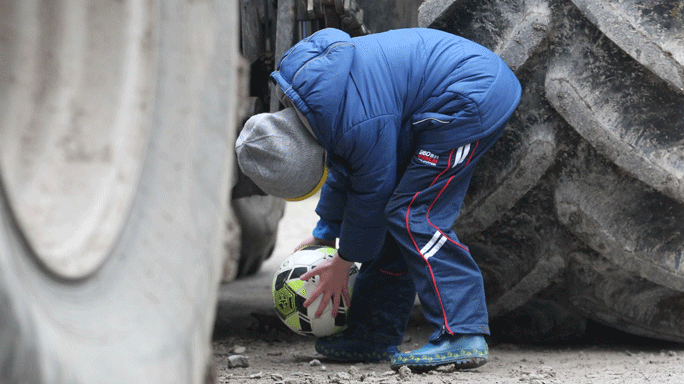Keeping children safe on farms requires vigilance 52 weeks of the year

July 15th – 19th is Farm Safety Week across Ireland, but keeping children safe on farms requires vigilance 52 weeks of the year. A momentary lapse can lead to the type of pain that I don’t want to even try to imagine.
As someone who was raised on a farm but no longer lives on one, I visit farms rather than reside on them. My farm visits are quite frequent – as my brother farms, so do numerous cousins and friends. I like bringing my children to farms – it is a great learning environment. I want them to have an appreciation for farming and to understand where their food comes from. I enjoy sharing my passion for farming with them.
However, I never let them out of my sight, as the risks are simply too great, especially at their ages (9 and 7). I get a chill when I see an unfenced slurry pit, a badly hanging gate or any of the other potential hazards that litter some farms. My “risk radar” remains finely tuned as my visits tend to be relatively short and I can remain on high alert.
For full-time farmers, part of the challenge is the natural human tendency to stop noticing familiar things that others with fresh eyes immediately see. I heard of a discussion group who visited each others’ farms to undertake a “safety audit”. Numerous risks were identified.
Farms are complex workplaces. Very few workplaces are frequented by children. When you add in live animals and powerful machines, you create a very dangerous environment. That is the reality. Children in the workplace is not the norm - imagine the reaction if my children walked into a building site in Dublin or into a Glanbia factory.
I know the dangers as I experienced them in my formative years. I fell from a load of bales. I dealt with upset cows and dangerous bulls. I jumped from a moving silage wagon. I stood on the steps of a fast moving tractor. I was in the cab when a stone from the silage harvester came through the windscreen. In hindsight, I put myself at risk in ways that I now recall with a chill. I lived to tell the tale, but I certainly would not let my children do what I did.
Is that being too protective and “wrapping them in cotton wool”. I don’t think so. I feel privileged to have grown up on a farm. We need to keep bringing our children to farms, but we need to bring them home safely every day. Think farm safety – and not just during farm safety week.
Precautions should be taken to prevent incidents causing death or injury to children on the farm:
- Secure play areas should be available, away from the farmyard.
- Children should be kept away from the yard when work is taking place and should only enter the yard accompanied by an adult and when it is safe to do so.
- When silage is being harvested, children should be out of the yard, away from the dangers of the machinery.
- Open water tanks and slurry stores should be fenced off.
- Extreme care should be taken when slurry is being spread that no children are present.
- All agitation points should be covered by a safety grid and a lid that cannot be opened by children.
- Children should be kept away from dangerous areas of the farm, eg. Chemical store and empty chemical containers, slurry stores, stacks of bales, dung-steads, dangerous livestock - Bulls, Cows, Rams etc.
- Most of the fatalities (20 – 57%) involving children on farms (2008-2017) were caused by falls from height. Children should be kept away from heights on the farm.
- Children under 7 should never be in a tractor.
- Children between 7 and 14 can travel as a passenger in a tractor if a passenger seat and seatbelt is available.
- Teenagers over 14 may drive tractors and self-propelled machines on the farm if proper training is provided and they are capable of safely operating the machine.
- Children should be kept clear of machinery unless they have been adequately trained to operate it in a safe manner and are old enough to do so.
- Explain the dangers on the farm to children.
- Ensure that anyone who may be working on the farm (employee or contractor) is aware of the potential presence of children.
- If children are handling animals, they should wash their hands thoroughly afterwards to minimise the risk of zoonosis' infection.
First Published 16 July 2019
